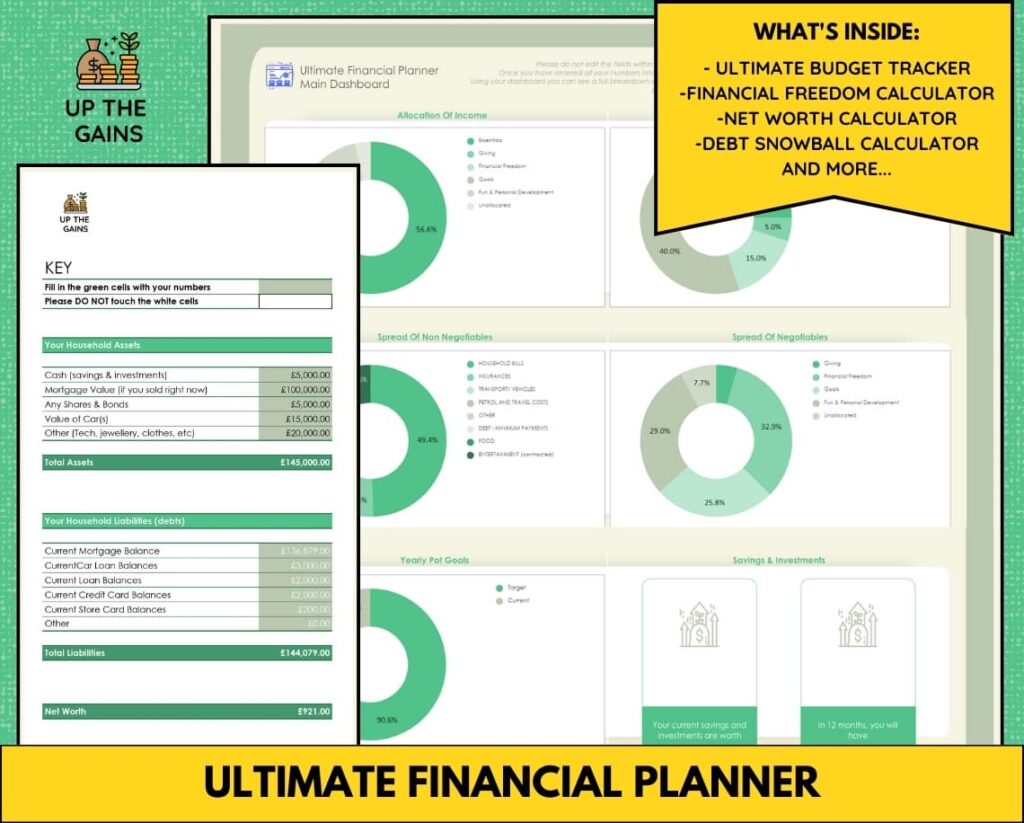
Sammie Ellard-King
I’m Sammie, a money expert and business owner passionate about helping you take control of your wallet. My mission with Up the Gains is to create a safe space to help improve your finances, cut your costs and make you feel good while doing it.
If you want to achieve your financial goals as a household, then it all starts with a budget. A simple household budget is crucial to understanding where your money comes from and where it goes.
It doesn’t matter if you’re on minimum wage or earning a six-figure salary — If you have a budget, you know exactly where you stand.
Contrary to many beliefs, simple household budgeting isn’t all about restricting your expenditures. It’s about understanding your finances and planning how best to allocate those funds.
Your household budget spreadsheet should summarise, compare, and ensure every penny is spent or saved for something worthwhile.
But what about having fun?
Setting aside a contingency budget or a fun-only budget within your overall one is so important. What’s the use in working all your life just to save every penny and never get out to see the world.
In this article, we’ll show you how to make a budget and list out some simple budgeting tips.
Table of Contents
How to make a household budget?
Creating a simple household budget can be frustrating, but staying on it is even more challenging.
We understand it’s difficult to keep your finances together and we also want to know how much money we need to live comfortably so here are the top ten tips for starting your simple household budget.
1. Write Down Your Total Income
One of the keys to a simple household budget-making process is to know the amount of money you’re working with.
Write down your total monthly income at the top, and plan your expenses based on the final amount.
This should consider the money you and your spouse constantly earn in a month.
If budgeting on a fluctuating income, endeavour to write down the average monthly income or an estimate of the amount you expect to receive.
The idea is to have the available money work for you without incurring any new or potential debt.
Doing this should help protect you from spending all your earnings, allowing you to stick to the basic principle of budgeting — Your monthly spending not exceeding your disposable income.
2. Develop A Basic Household Budget Spreadsheet
Feeling in control of your finances is the best way to be confident about your financial actions.
There are numerous ways to control your finances, but a simple household budget spreadsheet is the most effective if you want to budget your money confidently.
They help if you struggle with the various expense categories for your budget. A simple household budget spreadsheet that can help you organise and keep track of everything in an orderly fashion is the best.
We’ve built the perfect one below or if you prefer technology then check out the best budgeting apps!
Using templates spreadsheets or apps will help you learn how to create an easy budget and stick to it!

3. Decide Why You’re Budgeting
Household budgeting is meant to serve one primary goal of planning for every penny and knowing where it goes.
At the personal level, a simple monthly budget can also keep you organised and focused on your individual financial goals.
That’s why it’s critical to know exactly why you’re creating a budget in the first place. For example, you could be saving for a new extension, your children’s university fees, or a new car. Each goal is unique to you.
Identify important financial goals you want to achieve and create a short-term or long-term plan that helps prioritise what’s most important to you.
An example of this could be I want to save £500 for emergencies in the short term, but I want to save £20,000 for a house deposit over the next five years.
4. Ways To Save On Household Expenditure
Creating an implementable budget is impossible if you don’t understand your routine expenditures.
Look through your previous budgets and receipts to identify the basic needs and expenses that can be cut.
Sometimes you may be surprised at how much you’ve spent on certain unnecessary items or by overspending on the weekly food shop.
This should provide you with the best chance to see where adjustments are needed and how to cut unnecessary budget expenses.
Maybe you could cut your TV and internet subscriptions by half or reduce your monthly gas costs by switching providers. There’s always something in the budget that you can look at improving.

5. Consider automated budgeting apps
Technology is critical in relieving the tedious aspects of budgeting and preventing mistakes. One way to integrate technology into your simple household budgeting process is to consider the best money saving apps for a household budget.
Common apps for household budgets allow seamless connection to your bank accounts. They can facilitate tracking and categorising your expenses so you can see where your money is going.
Apps for the household budget also come with numerous useful features and tools to address wide-ranging personal finance and money management issues.
Other than the budgeting apps, try automating your savings as an easy way to stay on track with your savings plan.
Allow automatic money transfers from your current account to your emergency fund or retirement savings account.
This will let you prioritise saving instead of spending.
Some of our favourite saving apps include:
6. Share the responsibility
The best way to create a simple household budget is to get all your family on board. It’s essential to agree with your partner and plan some clear financial goals you want to achieve together.
Instead of enforcing restrictions on everyone’s spending habits, ask for their suggestions and advice on how to cut down on expenses.
Determine how much spending money you all should have and schedule a family catch-up to see how well you’re doing. This is vital, even if you’re relying on apps for your household budget. I’d also look at getting the kids involved.
This is an incredible way to teach kids the value of money and ensure they get the foundations they’ll eventually need when managing a household budget.
By sharing the responsibility for the budget, everyone can chip in and make a big difference. Together you’re more powerful!
7. Make it a habit
Effective household budget management is nothing more than habit. Once you get into the swing of things and start seeing some results, it’ll lock in the behaviour.
You’ll start seeing opportunities in places you didn’t expect, and what better to absolutely smash your goals ahead of time. If that does happen, don’t forget to reward yourselves.
Checking in on yourself is vital, perhaps once on a monthly basis. Assess where you spent and where you saved, then make a list of things you can improve on.
This will help instil the good habits you are creating. Nobody gets it the right first time, so don’t set yourself these goals. Little by little, aim for improvement, and you’ll get there.
If you need to conduct a quick budget check use our free monthly expenses calculator.
8. Stick to Cash to Control Excess Spending
Credit and debit cards have made payments so easy just through a simple tap.
This convenience means you can be in and out of a purchase in seconds. Even though convenient, it can lead to overspending if not managed correctly.
It can be difficult to work out where you’re at with your budget if you spend like this. The simple expenses that don’t seem like much at the time of purchase can add up and end up busting your budget.
Whether relying on the best apps for household budget or not, the simple budgeting rule is to keep spending under control. You can achieve this quickly if you stick to cash instead of credit or debit cards.
Paying via cash might not be convenient, but it will help you effectively picture how much money you’re spending.

9. Try the Simple 50/30/20 Budget Rule
The 50/30/20 budget rule is a straightforward budgeting method to manage your money more effectively. It’s a sustainable way to budget for your money by breaking your monthly net income into three parts.
When budgeting with the popular 50/30/20 rule, the essentials take 50%. This includes all your absolute necessities like food, rent, and household bills.
The 30% caters to the desires, like TV subscriptions, clothes and nights out. Lowering the expenses under this category is the best way to limit your budgetary spending.
The remaining 20% is for savings and investments. This budget rule comes in handy in helping you maximise your money based on priorities.
It’s a simple plan that works for the long term to allow you to manage debt, create a savings culture and cater to unexpected expenses comfortably.
If you’re nowhere near this, then look to work towards this. It’s totally fine to start below these numbers.
In most cases, you won’t be anywhere near, but if you can get there in a year or so, you’ll be making some fantastic ground.
10. Keep All of Your Receipts
After establishing your simple household budget, it can be easy to stop tracking every tiny expense.
However, this is the only way to stick to your budget the next time you go shopping. Save your receipts and keep track of each expenditure.
Keeping the receipts also means knowing exactly where each penny went for the entire month. This helps you hold yourself accountable and prevent overspending since you know how much money is left in each budget line.
If you can’t save receipts or lose them, then try to use your banking app to write down what you’re spending.
FAQs
How do you make a simple household budget?
To make a simple household budget, start by calculating your total monthly income and listing all your monthly expenses, including fixed bills like rent and utilities, variable expenses like groceries and entertainment, and any debt payments.
Subtract your total expenses from your income to determine your monthly savings or surplus.
Adjust your spending as needed to stay within your income, and consider using budgeting tools or apps to help you track your progress and identify areas where you can cut costs.
Review and update your budget regularly to ensure it remains realistic and effective for your current financial situation.
What is a simple household budget?
A simple household budget is a plan for managing your income and expenses that tracks how much money is coming in and going out each month.
It typically includes a list of fixed and variable expenses, such as rent, utilities, groceries, and entertainment, as well as any debt payments or savings goals.
By creating and sticking to a budget, you can gain control over your finances, avoid overspending, and make progress toward your financial goals.
A simple household budget should be easy to understand and maintain, and can be adapted as your income or expenses change over time.
What is the 50 30 20 rule of money?
The 50/30/20 rule is a popular budgeting strategy that suggests allocating 50% of your income toward necessities like housing, utilities, and food, 30% toward discretionary spending like entertainment and hobbies, and 20% toward savings and debt repayment.
This rule is designed to help people balance their spending and savings goals, and to avoid overspending in any one category. By sticking to this rule, individuals can prioritise their financial goals, build an emergency fund, and avoid accumulating too much debt.
While the 50/30/20 rule can be a helpful guideline, it may not work for everyone and should be adjusted based on individual circumstances.
What is a normal budget UK?
There is no one-size-fits-all answer to what constitutes a “normal” budget in the UK, as it depends on individual circumstances such as income, expenses, and financial goals.
However, a typical household budget in the UK may include expenses such as housing, utilities, groceries, transportation, entertainment, and debt payments.
The amount allocated to each category will vary depending on individual circumstances, but budgeting tools and guidelines such as the 50/30/20 rule can be helpful in creating a realistic and effective budget.
It’s important to regularly review and adjust your budget to ensure it remains aligned with your financial goals and priorities.
Final Thoughts
Well done, you’ve made it this far.
Creating a simple household budget is the first step toward smashing your financial goals. Getting your family together and nailing your household budget will do wonders for you.
Share on social media
Disclaimer: Content on this page is for informational purposes and does not constitute financial advice. Always do your own research before making a financially related decision.



